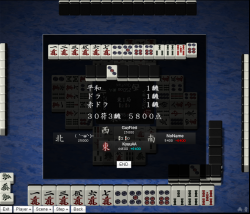End game scenarios

Normally, the game ends after the dealer loses in South 4 (for hanchans) or East 4 (tonpussen). However, depending on the rules, the game might not end then and there. In addition, a game can end early if a player runs out of points.
Rule overview
A game can end under the following circumstances (though it can vary by ruleset):
- It is all last (East 4 for tonpuusen, South 4 in hanchan), the dealer did not renchan, and at least one player is above the goal score.
- If no player is above the goal score, the game continues for a maximum of one wind round, known as enchousen. If someone reaches the goal score by winning then, the game ends immediately. After South 4 / West 4 ends, the game ends even if nobody reached the target score.
- If someone falls below 0 points, the game ends immediately.
If a ruleset does not use a goal score, the game ends after all last.
Oorasu
Oorasu 「オーラス」, or "all last", is the term used for the last round of the game, barring renchan. This is South 4 for hanchans, and East 4 for East-only rounds. Once the dealer fails to renchan, and the top player has reached the goal score, the game ends.
Agariyame
Agariyame 「和了り止め」 is a rule which dictates whether the dealer can renchan or not during all last. There are three main settings:
- A dealer must end the game if they are 1st after winning in all last. Non-1st place dealers must renchan if they win. (Most notably, this is the rule used in online clients like tenhou.net and Mahjong Soul.)
- A dealer must start a new renchan if they win in all last, even if in 1st place.
- Any dealer, regardless of place, can choose to end the round once they win in all last.
If tenpai-renchan is enabled, the same rules apply for a dealer in tenpai as they do for winning. Regardless, this setting affects all players' ability to change placement.
Goal Score
The goal score, or target score, is the minimum score that the top player must have in order to end the game. It is set before the game starts. Usually, players start with 25,000 points with a goal score of 30,000 points - but this can change depending on the ruleset. Some rules do not have a goal score.
Enchousen
If first place's points are below the goal score by all last, the game starts an enchousen 「延長戦」, or an extra "sudden death" round. During enchousen, when a player wins a hand and scores above the goal score, the game ends. However, ryuukyoku cannot end the game.
Most, if not all, rulesets with a goal score only allow a maximum of one wind round's worth of enchousen. If the game goes on past West 4 (hanchan) or South 4 (tonpuusen), the game ends, even though no one reached the goal score. While a few house rules may allow indefinite enchousen, by default, assume that it lasts only 1 wind round maximum.
Tobi
Tobi 「トビ」 is a rule that ends the game once a player falls below 0 points. Some game settings disable tobi, thus allowing the game to continue even when a player goes negative. Tobi is often disabled for televised matches, which do not desire a premature ending to the game.